

The Need to Complete. Why Diablo 3 is less addictive than Diablo 2: a “scientific” explanation. UPDATE: Got a response from Blizzard!
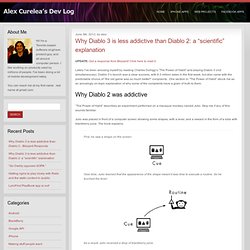
Click here to read it. Lately I’ve been amusing myself by reading Charles Duhigg’s “The Power of Habit” and playing Diablo 3 (not simultaneously). Diablo 3’s launch was a clear success, with 6.3 million sales in the first week, but also came with the predictable chorus of “the old game was so much better!” Instapaper’s (anti-)social network. Ben Brooks noticed and blogged about how Instapaper’s social features, introduced earlier this year, are minimal: There’s just a list of articles that people you chose to follow decided that they liked.
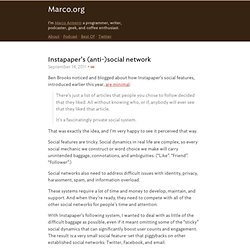
All without knowing who, or if, anybody will ever see that they liked that article. It’s a fascinatingly private social system. That was exactly the idea, and I’m very happy to see it perceived that way. Social features are tricky. Social networks also need to address difficult issues with identity, privacy, harassment, spam, and information overload. Facebook redesigns Friend Request emails to be a bit friendlier. Facebook has redesigned the look of its friend request emails.
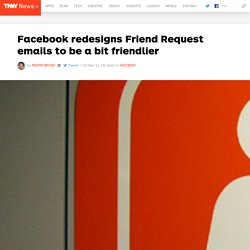
Now when a user sends you a friend request, you may well get one that looks like the one below, with details about how many friends, photos and wall posts a user has, along with the number of groups they’re a member of. There’s also now a link to see all your pending friend requests. All Facebook reported the new design first, and sure enough, fellow TNW-er Brodie just sent me a friend request and there was the new look.
Smart Gamification GDC2011. Think Vitamin » Emotional Interface Design: The Gateway to Passionate Users. We’re changing.
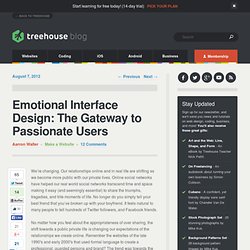
Our relationships online and in real life are shifting as we become more public with our private lives. Online social networks have helped our real world social networks transcend time and space making it easy (and seemingly essential) to share the triumphs, tragedies, and trite moments of life. No longer do you simply tell your best friend that you’ve broken up with your boyfriend. It feels natural to many people to tell hundreds of Twitter followers, and Facebook friends. No matter how you feel about the appropriateness of over sharing, the shift towards a public private life is changing our expectations of the relationships we create online.
Figure 1: Kenny Meyers uses humor in his portfolio to connect with his audience. Need Game Mechanics? I'm a fairly competitive person.
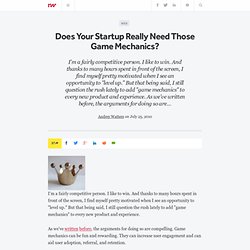
I like to win. And thanks to many hours spent in front of the screen, I find myself pretty motivated when I see an opportunity to "level up. " But that being said, I still question the rush lately to add "game mechanics" to every new product and experience. As we've written before, the arguments for doing so are compelling. Game mechanics can be fun and rewarding. But does the addition of levels, leader-boards, and virtual trophies necessarily lead to a better user experience? In a recent blog post titled, "Why You Should NOT Integrate Game Mechanics Into Your Service," Gaurav Mishra, CEO of 2020Social points to the ways in which the pressure to add points and badges can obscure some of the other important considerations when developing an application or service.
We Don't Need No Stinking Badges. CityVille Explained. [In the first of a two-part series, design veteran Tadhg Kelly draws from his What Games Are blog to explain the rise to power of Zynga's massively successful social game CityVille.

(UPDATE: Part 2 now posted.)] Check out the latest Appdata graph for Zynga's Cityville - that's right, it now has nearly 70 million monthly active users, and the Facebook game only launched in early December. I know what many of you are thinking: How does Zynga keep doing this? At the Getting Social event at BAFTA (In London) a few days ago, this was the question that everyone was asking. While TV companies in the UK have dipped their toes into social games, such as Corrie Nation, they have had pretty miserable success rates. And yet here comes CityVille, another Zynga game that looks quite a lot like other developers' games, they waltz in, do their thing, and boom!
It's not just Zynga. I decided to write an article about how games like CityVille manage to be successful. Social Patterns. Social Interaction Design by Adrian Chan: What's there to like? Facebook’s recent F8 announcements concerning the Like button, connected pages, and Open Graph api have resurrected some discussion around social objects.
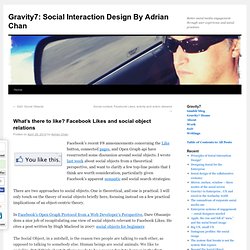
Facebook: still a data roach motel when compared to Twitter and. Twitter has done something really remarkable: they have made the entire database of Tweets available to other companies.
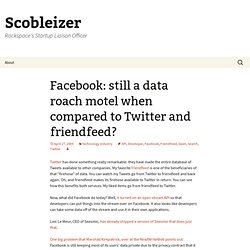
My favorite friendfeed is one of the beneficiaries of that “firehose” of data. You can watch my Tweets go from Twitter to friendfeed and back again. Oh, and friendfeed makes its firehose available to Twitter in return. You can see how this benefits both services. My liked items go from friendfeed to Twitter. Now, what did Facebook do today? Andrea Vascellari - Mozilla Firefox.